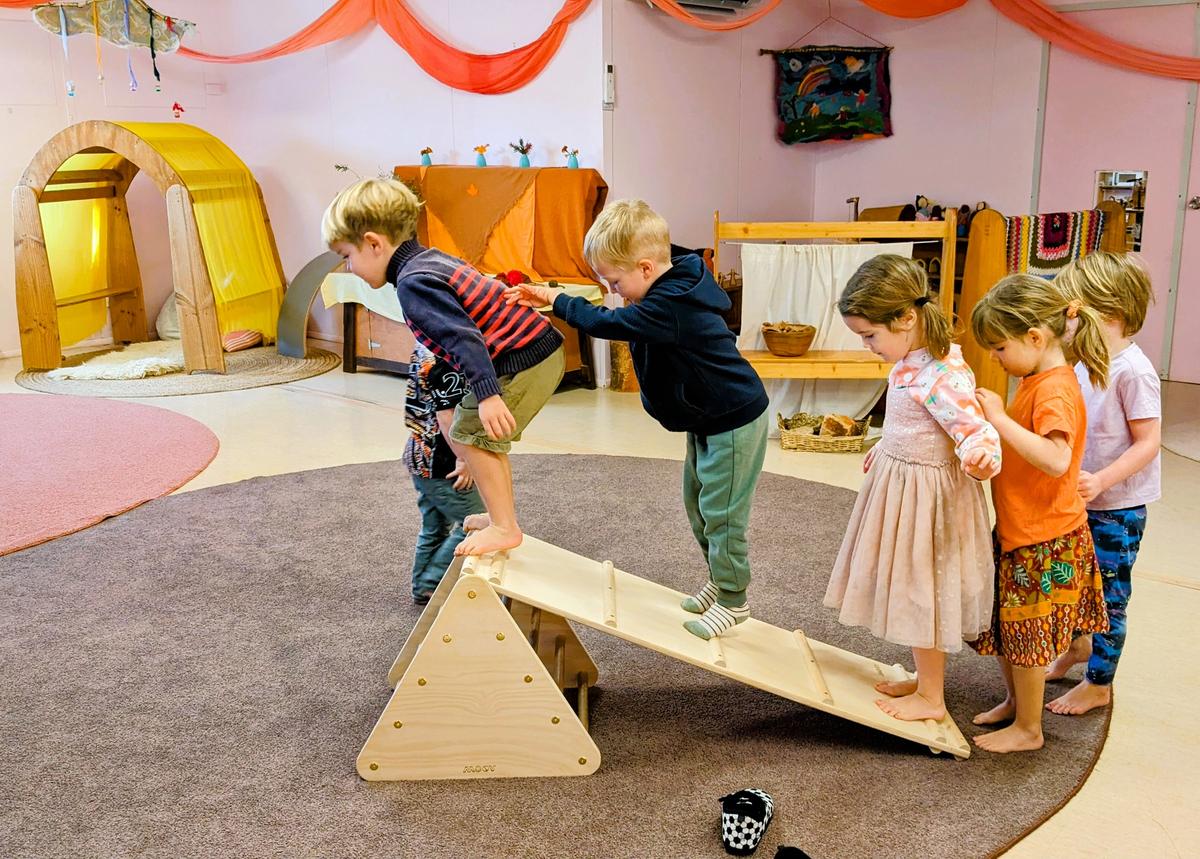Ruby Saltbush News
DIERDRE AILA

Ruby Saltbush News
DIERDRE AILA
The Ruby Salt Bush children have been taking a keen interest in climbing lately – especially with our new indoor climbing equipment!
Outside, we are lucky to have a combination of different climbing frames, the fort, the slide cubby and of course our climbing tree, as well as the stepping stone logs and various rocks and boulders. A few children have also been creating obstacle courses with the frames, chairs, tables, steps and whatever else they can haul over – which everyone else has enjoyed trying to manoeuvre up and over!
Climbing engages multiple parts of the brain and helps children develop skills like spatial awareness, hand-eye coordination and even working memory.
It enables children to learn to make decisions, solve problems and to take risks at the same time as developing physical strength, balance and agility.
It also creates improved self-esteem and independence as children learn to successfully set their own targets and plan and adapt their own routes. As a result, children feel more confident and capable of taking on new risks, from social situations to classroom learning.
Plus, climbing is just plain fun!






















For those wanting to know more about climbing and child development…
Having good climbing skills is important for all children, as it:
1. Improves Dexterity
The act of climbing requires coordination between a child’s hands, eyes, arms, legs, and feet. As children climb, they are using their hands to grip, hold and often support all of their body weight. This improves strength in the fingers, hands, arms and shoulders. These are the muscle groups which are absolutely vital to provide a stable support base for fine motor tasks such as handwriting and cutting skills.
2. Improves Physical Strength
Climbing is a whole-body activity that gets children working all their muscle groups. We push with our legs and pull with our arms to gain height. The core is engaged to provide support and stability. This action simultaneously improves their grip, upper body strength, and arm strength. Since climbing involves lifting your body weight, it’s a great way to strengthen bones.
3. Builds Confidence
Climbing reinforces children’s motivation to succeed as an individual - they can set their own personal targets, leading to a real sense of achievement, pride, motivation and focus.
4. Develops Problem Solving Skills
Problem-solving is intrinsic to climbing too, as there will always be different routes that can be taken. So much in our preschool yard can be manipulated and restructured by the children to create brand new obstacles. Safe risk taking is an important life skill for children to learn to both manage and assess risk, weigh the benefits against the potential harm and have the confidence to follow through. Is it too high for me? Can I reach that far? Will that foothold throw off my balance? Will I fall? Which way will I go? Where will I put my feet/hands? How will I get back down? The brain is working hard.
5. Improves Proprioception and Vestibular Sensory Systems
Proprioception is knowing where our body is in space – what our arms and legs are doing without having to look at them. Children develop improved spatial and body awareness by the stretching, swinging, reaching, pulling and pushing actions experienced during climbing The vestibular system takes information from our inner ear and eyes and sends this to the brain. It detects motion and where our heads are in relation to the ground. When kids climb, they need to make some “calculations” in their heads to estimate distances and understand how their movements relate to the position of the climbing structure. If we are in danger of falling – it is the vestibular system that kicks in and tells our brain to try and regain balance.
Older children develop good climbing skills to the point where they can hang upside down, rotate and twist their body in space… they are stimulating the vestibular system.
6. Develops Focus and Concentration
Care is needed when climbing. Children need to think about the next move and take care with the placement of hands and feet in order to prevent falls. Adult support with verbal cues can help.
7. Improves Balance
Having good balance is an important pre-requisite for almost every gross and fine motor skill. Climbing in the natural environment like our preschool garden provides additional challenges: stepping-stones are rarely flat, tree branches come in all different widths and heights, rocks can be slippery.
8. Enhances Social Skills
Climbing often involves cooperation as one child will lend a hand to another, take turns going down the slide or across a branch. Competent climbers can offer encouragement to those who are a little fearful or reluctant – having another child to cheer you on can be very empowering. It can also stimulate language and imagination between peers as children imagine they’re scaling a mountain or climbing a ladder into a pirate ship.